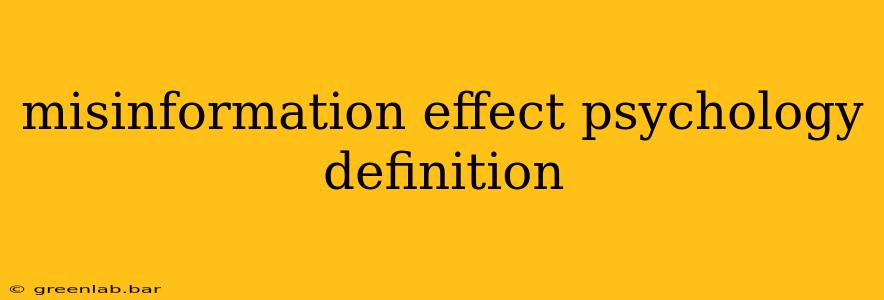The misinformation effect, a fascinating phenomenon in cognitive psychology, refers to the impairment of memory for past events that arises after exposure to misleading information. Essentially, it's the subtle yet powerful way inaccurate details can seep into our recollections, altering them in sometimes dramatic ways. Understanding its mechanics is crucial, not just for psychology students, but for anyone navigating the complexities of memory and information in our modern world.
Defining the Misinformation Effect: More Than Just "False Memories"
While often conflated with the creation of entirely false memories, the misinformation effect is more nuanced. It doesn't necessarily involve planting a completely new memory; instead, it focuses on how existing memories are modified by subsequent misleading information. This subtle distinction is key. The effect highlights the malleability of memory – a reconstructive process rather than a simple playback of recorded events.
Key Components of the Misinformation Effect:
-
Exposure to Misleading Information: This is the crucial first step. This could be anything from a suggestive question, a subtly altered photograph, or a narrative that contains inaccurate details. The source doesn't have to be malicious; it can be unintentional.
-
Memory Integration: The brain doesn't passively store memories. It actively integrates new information with existing knowledge, leading to a blending of factual and misleading elements. This is where the "misinformation" gets incorporated into the original memory trace.
-
Memory Distortion: The result is a distorted memory – a blend of the original experience and the later misleading information. This distortion can range from minor inaccuracies to significant alterations of events.
How the Misinformation Effect Works: A Look at the Cognitive Processes
Several cognitive processes contribute to the misinformation effect:
-
Source Monitoring Errors: Our brains aren't always accurate at tracking the source of information. We might struggle to distinguish between what we actually witnessed and what we later heard or read.
-
Memory Consolidation: The process of strengthening and stabilizing memories is vulnerable to interference. Misleading information introduced after an event can disrupt and alter the original memory trace during consolidation.
-
Schema-Driven Reconstruction: Our existing schemas (mental frameworks for understanding the world) influence how we interpret and remember events. If misleading information fits our schemas, it's more likely to be incorporated into our memory.
Real-World Implications of the Misinformation Effect
The implications of the misinformation effect extend far beyond the psychology lab. Consider these examples:
-
Eyewitness Testimony: The legal system relies heavily on eyewitness testimony, yet research shows that this testimony can be remarkably susceptible to the misinformation effect. Leading questions from investigators or exposure to media reports can significantly alter a witness's recollection of events.
-
Historical Narratives: The way historical events are presented and recounted can shape collective memory. Misinformation, intentional or unintentional, can subtly distort our understanding of the past.
-
Social Media and Fake News: The rapid spread of misinformation through social media platforms poses a serious challenge. The constant bombardment of inaccurate information can influence individual beliefs and even societal perceptions.
Protecting Against the Misinformation Effect: Strategies for Stronger Memory
While memory is inherently malleable, we can employ strategies to mitigate the misinformation effect:
-
Careful Source Evaluation: Critically assess the reliability of information sources. Look for evidence-based information and avoid spreading unverified claims.
-
Memory Techniques: Employ mnemonic devices and memory-enhancing strategies to strengthen memory encoding and retrieval.
-
Metacognitive Awareness: Develop an awareness of your own memory processes and potential biases. Recognize that memories are reconstructive, not purely reproductive.
The misinformation effect serves as a stark reminder of the limitations of human memory and the importance of critical thinking. Understanding this phenomenon is vital in navigating an increasingly complex information landscape, ensuring accurate recollections, and making informed decisions.

